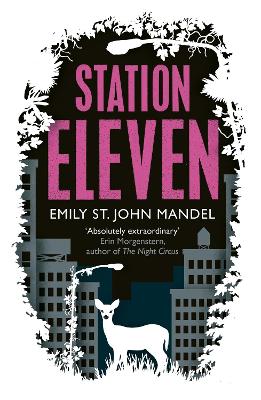Reviewed by sarahjay on
I see her mouth move. My mouth? "I did not like it," she whispers.
"What do you mean?" I cannot tell if I hear myself aloud, or if the words stay inside my head. "Did not like what?"
"I did not like Station Eleven."
I gasp - or try to. But I cannot breathe. How can this be? This book... it's so beloved, so praised. "Darkly glittering," the dust jacket says. The beautiful, beautiful dust jacket. The cover is so pretty. Everyone says so.
I have stared in the mirror before, but this... this deep betrayal is new.
I see a wide void open up behind me. No - behind her. It's darkly glittering. My reflection begins to scream, but I cannot hear her. She is swallowed up, leaving me alone. Truly alone.
Here I am to talk shit about your fave.
This book was next in line in my dystopian list. It had been sitting on my shelf for ages. I thought, I can't possibly call myself a fan of female-authored dystopian lit without having read Station Eleven. So, here we are. I have read it. I finished it a couple of hours ago, and I am already forgetting the names of every single character. Fly away, forgettable characters. Fly away and be free.
I saw a lot of positive reviews of people saying some variation of "this wasn't what I was expecting, but I loved it!" This book was not what I was expecting, and I hated it. I expected something beautifully written (all right, fair enough for the most part, that aspect was fine) about the end of the world. What I got was a book about... like... theatre people. And how it's real hard being a celebrity, and it's also real hard to be a paparazzo. And also, by the way, a plague killed like 99% of the population, everyone misses cell phones and there's a prophet guy in this one town.
I mean, I can understand why people like it... I think. But if you give me a novel that is advertised as a dystopian (i.e., the world has dramatically changed in some terrifyingly irreversible way and now everyone left has to adapt to survive) but then spends half the story on this guy named Arthur (that's his name, right?) who was from this really small island that no one's ever heard of, who really wants to be an actor, and then he meets this much younger woman, and they get married, but then he falls in love with someone else and has an affair, and then that happens two more times in exactly the same kind of way, and then expect me to care about him whatsoever, you have given me the wrong type of book. "It's hard to be famous," he whines to the entertainment journalist who used to be the paparazzo. "I'm so tired." Okay. Me too, Adam. I read this book about you and now I'm also tired.
Look, the thing is, I have no patience for stories that are basically like "man, it's just, art is so important, you know?" Which I think... maybe that's what this book was trying to say? I guess? It's definitely in there. I'm still trying to figure out what was important to learn from the history of Aaron's ex-wives and how he wanted to be famous and successful, then hated it once he was famous and successful, then he died, and then a plague killed almost everyone. Is the point of this book that life is pointless? Except for like, the art, maaaan. Ashton gets it. Here's yet another chapter about him.
I'm giving this book two stars solely because of two things:
1. The Traveling Symphony's motto was "Because survival is insufficient," which is a quote from Star Trek: Voyager, a show I love, and
2. There's this one scene right in the beginning where the ex-paparazzi guy hears rumors about the flu epidemic and goes shopping, and he fills up seven shopping carts and walks them to his brother's condo or wherever he lives, and he brings them up to his room and the brother, whose name is Frank, answers the door and is like "I see you went shopping." This made me laugh.
I feel like I should be apologizing, because everyone adores this book. Maybe I shouldn't have read it right after reading The Power, a book I'm still obsessing over. Maybe I shouldn't have been watching The Handmaid's Tale while taking breaks from this book. Or maybe it should just have been advertised correctly, which is to say: it's mainly a book about a famous guy who dies during a performance of King Lear and also, sometimes, it's about these other people who knew him in different ways having lives that intertwine in various, non-interesting ways, none of whom you spend enough time with to begin to care about them. And also a plague.
Anyway, I'm not apologizing. I think what I think. This isn't really a dystopian to me. It has dystopian elements, sure. But to me, a good dystopian novel says something that matters. And this book didn't say anything revolutionary to me, nothing that countless other navel-gazing books about the importance of art and literature and shit haven't already said. I didn't like it. I wanted to, and I didn't.
Void, swallow me up now.
Reading updates
- Started reading
- 26 December, 2017: Finished reading
- 26 December, 2017: Reviewed
